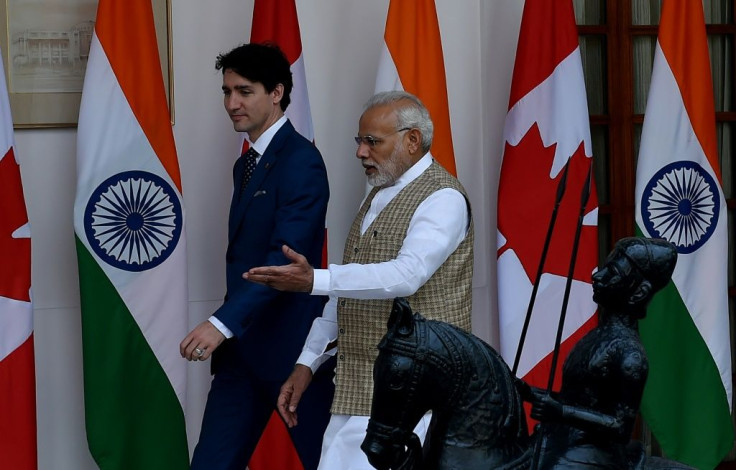Canada-India Ties In 'Difficult Phase,' Indian Minister Says After US, UK Back Ottawa Over Diplomats Issue

KEY POINTS
- Indian minister S Jaishankar said New Delhi asked Ottawa to withdraw diplomats to invoke diplomatic parity
- Canadian PM Justin Trudeau had criticized India for asking Canada to reduce diplomatic presence in India
- The U.S. and the U.K. backed Canada in the issue over the withdrawal of diplomats caused by India and Canada's recent fallout
India and Canada are going through a "difficult phase," said Indian external affairs minister S Jaishankar days after the U.S. and the U.K. backed Canada over the issue of withdrawing diplomats.
Jaishankar said New Delhi's decision to ask Ottawa to withdraw its diplomats was to invoke diplomatic parity and also due to Canada's "continuous interference" in Indian affairs.
"There's this whole issue of parity... how many diplomats there are of one country versus how many diplomats there are of the other country," the minister said Sunday.
"Parity is very much provided for by the Vienna Convention, which is the relevant international rule on this," Jaishankar said. "But in our case, we invoked parity because we had concerns about continuous interference in our affairs by Canadian personnel. We haven't made much of that public. My sense is, over a period of time, more stuff will come out and people will understand why we had the kind of discomfort with many of them, which we did."
"The relationship right now is going through a difficult phase. But I do want to say that the problems we have are with a certain segment of Canadian politics and the policies which flow from that," he added.
India-Canada ties have been fraught since Canadian Prime Minister Justin Trudeau alleged India's potential link in the killing of Indian-born Canadian citizen Hardeep Singh Nijjar, who advocated for a separate Sikh state carved out of India and was a wanted terrorist in the South Asian country.
The spat led to New Delhi suspending the issuance of visas to Canadian citizens. Jaishankar said Sunday that the suspension was because it was no longer safe for Indian diplomats to go to work.
"Their safety and security was the primary reason we had to temporarily stop the issuance of visas," he said.
"My expectation is that the situation would improve in the sense that our people would have greater confidence in being able to do their basic duty as diplomats because, as you know, ensuring the safety and security of diplomats is the most fundamental aspect of the Vienna Convention," Jaishankar said.
The Indian minister said India would resume visa services if there was progress on the safety of Indian diplomats in Canada.
Canada announced last week that it had withdrawn 41 diplomats in India.
Trudeau said on Oct. 19 that India's decision to revoke diplomatic immunity to 41 Canadian diplomats working in India was a "violation of the Vienna Convention governing diplomacy" and would also impact "millions of Canadians who trace their origins to the Indian subcontinent."
The U.S. and the U.K. backed Canada on Oct. 20 over the issue of India forcing Ottawa to withdraw diplomats.
"We are concerned by the departure of Canadian diplomats from India, in response to the Indian government's demand of Canada to significantly reduce its diplomatic presence in India," U.S. State Department spokesperson Matthew Miller said. "Resolving differences requires diplomats on the ground. We have urged the Indian government not to insist upon a reduction in Canada's diplomatic presence and to cooperate in the ongoing Canadian investigation."
The U.K. also criticized New Delhi for its decision to ask Ottawa to reduce its diplomatic presence in India.
"We do not agree with the decisions taken by the Indian government that have resulted in a number of Canadian diplomats departing India," a spokesperson for Britain's Foreign Office said.
© Copyright IBTimes 2024. All rights reserved.




















